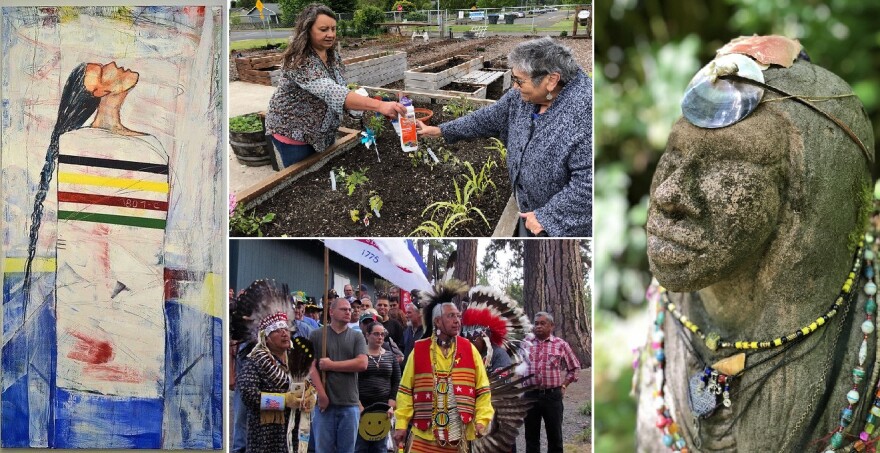The Native American Journalists Association (NAJA) has announced its annual list of winners in its national Native media awards competition.
KLCC won first place in the “Best Coverage of Native America” category for Radio/Podcast for “Borders, Migration, and Belonging: Native Voices”. Supported by the University of Oregon’s Wayne Morse Center for Law and Politics, this in-depth series explored issues important to Indigenous communities in the state, including tribes’ timber practices, the return of Indian artifacts, cultivating interest in traditional foods, and the evolution of the Native American art scene. Reporters Brian Bull and Karen Richards were reporters for the series; Rachael McDonald was primary editor.
Richards also swept Associate Division III for Radio/Podcast, winning first, second, and third place awards for Best Feature Story. Her submissions were also from the Wayne Morse Series: “Indigenous Artists Work for Recognition and Change”; “Native Oregon History Goes Public”; and “Native Oregon Artifacts Coming Home.”
Bull won a second place award in Professional Division III for Radio/Podcast, for his feature, “Nearly Two Years’ Work by Native Carvers Yields Totem Pole for Sheldon High.”
The annual competition recognizes excellence in reporting by Indigenous and non-Indigenous journalists from across the U.S. and Canada. NAJA received more than 550 entries spanning many different categories and mediums.
(Page updated 9/28/20)

The Public Media Journalists Association has awarded KLCC with a First Place win for Writing, Division C.

The winning submission was for a feature from reporter Brian Bull, titled CAHOOTS At 30 Part I: Crisis Response Teams ‘Assume Nothing’. His story profiles Eugene’s mobile crisis intervention service operated by the White Bird Clinic, and includes audio of a six-hour ride-a-long Bull did one evening with a CAHOOTS team as they responded to calls from residents of Eugene-Springfield.
Besides talking to medic Daniel Felts and crisis counselor Kimber Haws, Bull also talked to Eugene Police and a chronically-ill veteran who all praised CAHOOTS’ unique approach. Many cities are now considering that model given several high-profile cases of police brutality and deaths, including that of George Floyd and Breonna Taylor.
KLCC competes in PMJA’s Division C, which is comprised of small market public radio newsrooms across the United States.

The Radio Television Digital News Association has announced the winners of the 2020 Regional Edward R. Murrow Awards, honoring outstanding achievement in broadcast and digital journalism, technical expertise, and adherence to RTDNA’s Code of Ethics. Of the awards given to journalists, the Murrow Awards are among the most respected journalism awards in the world. KLCC News has won two Regional Murrow Awards: Overall Excellence and Excellence in Writing.

The Overall Excellence award included a newscast by KLCC’s Anni Katz, as well as stories by reporters Chris Lehman, Melorie Begay, Rachael McDonald, Brian Bull, Tiffany Eckert, and Amy Brenneman. It is the second consecutive year KLCC has won a regional Murrow in this category and division (Small Market Radio).
The Excellence in Writing award went to reporter Brian Bull for his three stories: Nearly Two Years’ Work by 100 Carvers Yields Totem Pole for Sheldon High; Forests Increasingly Contending with Homeless Encampments’ Waste and Trash; and Ghoulish Teams More than Shovel Ready for Coffin Races. It is the second consecutive year that Bull has won a regional Murrow in this category and division (Small Market Radio).
The Society for Professional Journalists has recognized two KLCC stories for their 2019 Northwest Excellence in Journalism Awards.
Chris Lehman was awarded for best feature reporting for his story, Oregon Lawmakers Consider Expansion of Oregon’s Death With Dignity Law.
Rachael McDonald was runner-up winner for Environment and Natural Disaster Reporting for her story: The McKenzie, A Resilient River, That story is part of KLCC’s year-long series on Oregon Natural Resources and Resiliency funded by the UO Wayne Morse Center for Law and Politics.








